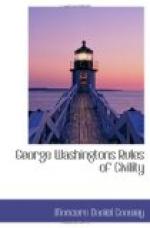“Jean Marie, pasteur of Lion-sur-mer, was a refugee in England from the St. Bartholomew massacre. He is supposed to have belonged to the same family as the Huguenot martyr, Marin Marie, a native of St. George in the diocese of Lisieux. It was in the year 1559 that that valiant man, who had become a settler in Geneva, was arrested at Sens when on a missionary journey to France, laden with a bale of Bibles and New Testaments, and publications for the promotion of the Protestant Reformation; he was burnt at Paris, in the place Maubert, on the 3d of August of that year. Our pasteur was well received in England, and was sent to Norwich, of which city he appears to have been the first French minister. He was lent to the reformed churches of France when liberty of preaching revived, and so returned to Normandy, where we find him in 1583. The first National Synod of Vitre held its meetings in that year, between the 15th and 27th of May. Quick’s ‘Synodicon’ (vol. i. p. 153) quotes the following minute:—’Our brother, Monsieur Marie, minister of the church of Norwich in England, but living at present in Normandy, shall be obliged to return unto his church upon its first summons; yet, because of the great success of his ministry in these parts, his church may be entreated to continue for some longer time his absence from it.’ He certainly did return to Norwich, because on 29th April 1589 the manuscript Book of Discipline was submitted to the consistory for signature; and Jan Marie signed first, and his colleague M. Basnage, second. One of his sons, Nathaniel Marie, became one of the pasteurs of the London French Church, and married 1st, Ester, daughter of the pasteur Guillaume De Laune, and 2dly (in 1637), Ester le Hure, widow of Andre Joye. The Norwich pasteur had probably another son named after himself, a commercial residenter in his native city; for two sons of a Jan Marie were baptized in Norwich French Church: (1) Jan on 3d February 1600, and (2) Pierre, on 6th July 1602. Madame Marie, probably the pasteur’s widow, was a witness at the first baptism.”
James Marye, with whom we are particularly concerned, sprang from the Catholic family, and was born at Rouen near the close of the seventeenth century. He was educated for the priesthood, no doubt at the Jesuit College in Rouen,—where, as we have seen, Father Perin’s book on manners was printed in 1651. However, James Marye abjured the Catholic religion in 1726. This caused a breach between himself and the family, which consisted of a widowed mother and her two other sons,—Peter and William (the latter an officer), both of whose names however, reappeared in their protestant brother’s family. In consequence of this alienation James migrated to England, where he pursued his studies, and was ordained by the Bishop of London. In 1728 he married Letitia Maria Anne Staige. She was a sister of the Rev. Theodosius Staige, who was already in Virginia. For that colony the Rev. James Marye also embarked, in 1729, with his bride. Their first child (Lucy) was born during the voyage.




